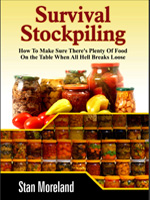Dr. Mark Sircus
IMVA
Unless you’ve been unconscious for the past few days you are probably aware that the situation in Egypt is becoming increasingly precarious for the government as well as for the people themselves who are experiencing their economy crumbling under their feet. Many families in Egypt are fast running out of staples such as bread, beans and rice and are often unable or unwilling to shop for groceries. “Everything is running out. I have three children, and I only have enough to feed them for maybe two more days. After that I do not know what we will do,” school administrator Gamalat Gadalla told CNN.
Current riots and civil unrest in Egypt, Jordan and Tunisia all reflect anger having reached a boiling point. This has been nothing like it since the fall of the Berlin Wall. The global revolts that are spreading across Northern Africa should provide insight into how crucially important the outcome of this phase of modern history will be to all of us around the world. There is a lot at stake in this world of ours. Not only is human freedom in general on the line but life is being threatened as the food crisis of 2011 continues to heat up.
The IMF told governments to tackle economic strains or risk instability and even “war”.
David Galland writing for the Casey Dispatch says, “It’s not hard to read the writing on the wall, and it’s scary. The population is growing at something like 3.5% per year. And unemployment is about 25%, which means that the ranks of young, unemployed, unmarried males—unquestionably the most dangerous creatures ever to have walked the Earth, including T-Rex—are swelling.” A telling fact on the Egyptian riots: “Many protesters are young men and women. Two-thirds of Egypt’s 80 million people are below 30 and many have no jobs. About 40 percent of Egyptians live on less than $2 a day.”
“There is no question that if the government had chosen to use machine guns to cut down the protesters, it probably would have succeeded in suppressing the revolt. If it had combined machine guns with switching off the Internet, it would have been able to cut the protest down, both literally and digitally. The difficulty that the government faces is obvious: it cannot continue to keep the Internet and landline telephone service from the general public. The modern economy is becoming increasingly dependent upon the Internet,” writes Gary North. We are getting our first real view of what can and will happen to countries in the digital age and how fast and badly things can break down into anarchy.
The supposedly most intellectual and most respected minds in the world have gathered for one of the most influential meetings of the year in Davos, Switzerland, but they don’t seem to understand how inferior their minds and hearts actually are. The I Ching, (an ancient book of Chinese wisdom) would certainly not label most of the attendees as superior men or women. The top politicians and corporate executives are doing nothing more than putting on a show for the masses of the mainstream in a huge theater. But they keep secrets in their pockets that they do not share with us. These certainly are not the kinds of people we should like, trust or respect. Certainly not one of them will ever capture the minds and hearts of the young all over the world who are getting more and more fed up with the fate and destiny of things that these “super people” in Davos are in large part responsible for.
“Governments across the developing world are stockpiling food staples in an attempt to contain panic buying, inflation and social unrest. But the hoarding is driving agricultural commodity prices even higher. The cost of wheat, the world’s most important staple, reached a fresh two-and-a-half-year high on Thursday, after countries from Algeria to Saudi Arabia announced extraordinary purchases. High food prices have been a contributing factor to the recent wave of social unrest across North Africa and the Middle East. In Algeria earlier this month, young rioters chanted, ‘Bring us sugar!’ The cost of the sweetener in the wholesale market is at its highest in 30 years. Earlier this week, Algeria bought 800,000 tonnes of wheat—much more than usual—and Saudi Arabia announced plans to double the size of its wheat stockpile. Bangladesh and Indonesia joined the rush on Thursday, placing extraordinary rice orders,” report Javier Blas in London and Chris Giles in Davos.
We said last week that Eric de Carbonnel is warning the world that, “Spiking food prices will likely cause competitive currency appreciation. Foreign exchange reserves exist for just this time of emergency. Central banks around the world will lower domestic food prices by either directly selling off their reserves to appreciate their currencies or by using them to purchase grain on the world market. Appreciating a currency is the fastest way to control food inflation. A more valuable currency allows a nation to monopolize more global resources.”
Only a week later we have reports coming in that this is exactly what is going on and this is going to come down on the back of humanity’s lower and middle classes in terms of outrageously-priced scarce foods. Governments know they cannot remain standing in the face of widespread hunger and starvation but there is really little they can do to stem the gathering tide.
Paul Joseph Watson of Prison Planet says, “Any country that retains its own sovereignty, acts primarily in its own interests and attempts to build itself up as a strong, prosperous, and culturally strong state is an enemy to the globalists. The international hierarchy demands compliance, dependence, weakness and a dilution of heritage and culture in order for every nation to be enveloped within the sphere of global government control.
“Make no mistake about it, we are seeing a global revolution, the age of rage is falling upon us like dominoes reaching to every corner of the planet. Whether or not the outcome will topple the current global hierarchy, as Zbigniew Brzezinski fears, remains to be seen, but it will surely depend upon who controls the new governments that will replace the ousted rulers—the people who started the process of change, or the World Bank, IMF, NGOs and the rest of the global elite who are desperate to save their world government agenda from being derailed.”
 |
| Protests in Tunisia |
These are people and they are not happy and they have many reasons to be unhappy. Governments exist supposedly with the stated objective to shepherd over the people. Governments are universally charged with the task of making sure the basic needs of the people are—the most basic need being avoiding hunger pangs.
What is really going to be sad going down the road a little longer is the fact that no government is going to be able to cope with everything that is coming down the tracks of humanity. Though there are many solutions that could be brought to bear to help what we call the human condition, nothing is in sight that will save the day. The present global leadership is too stuck-up in their own greed, insecurity and selfishness to bring much real intelligence to the task of serving humanity’s true needs.
 |
| Protests in Egypt |
In 2007, a British Defense Ministry report was released assessing global trends in the world over the next 30 years. In assessing “Global Inequality,” the report stated that over the next 30 years:
It’s now only four years later and we are already on the leading edge of this prediction. Bottom line is that we have collectively baked a bad cake and are now going to have to eat it. We have done, and continue to do, so many wrong things that all rightness is going get squeezed out of us.
Food, fuel and cash shortages being experienced in Egypt will come to the entire world in a financial catastrophe where the whole system goes down. Fires tend to spread and the conditions in Egypt are common to many people around the globe.
“It’s a small world after all,” was the theme song of the World’s Fair in Queens, New York almost 50 years ago and now it’s going to be too small for most of our tastes. Things happening on the other side of the planet in our new world order of things are going to take the food right off your plate because of higher prices and greater shortage. It is not going to be fun at all unless you are wealthy and can afford to maintain your present diet no matter what it costs.
RELATED ARTICLES:
7 Reasons Food Shortages Will Become a Global Crisis
5 Simple Ways to Prepare For The Coming Food Crisis
Food Shortages: Creating a Crisis to Force Global Food Control




Be the first to comment on "It All Starts Here"